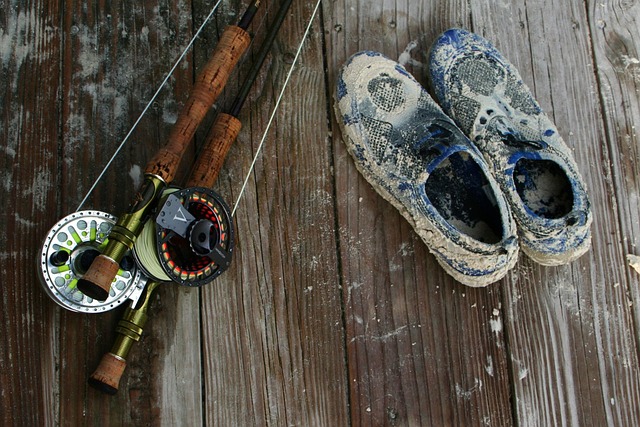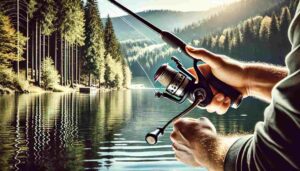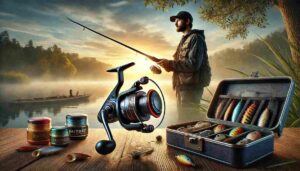Fly fishing is a beloved sport that requires a certain level of skill, technique, and equipment. One of the most important pieces of equipment is the fly rod, and choosing the right weight can make a significant difference in your overall experience. In this post, I’ll be discussing the differences between an 8-weight vs a 9-weight fly rod, and how to determine which one is the best fit for your specific needs. Whether you’re a beginner or an experienced angler, understanding the nuances of fly rod weights and actions can help you make the most of your time on the water.
What is a Weighted Fly Rod?
A weighted fly rod is a type of fishing rod that is designed to cast a fly line that matches the weight of the rod. Fly rods are typically labeled with a weight number, ranging from 0 to 14 or higher, with the lower numbers indicating lighter weight rods and the higher numbers indicating heavier weight rods. The weight of a fly rod refers to the amount of weight it takes to bend the rod into a U-shape when it is cast. The weight of the rod is important because it affects the casting ability of the rod and the distance it can cast the fly. Choosing the right weight for your specific fishing needs is crucial for a successful fly fishing experience.
Understanding Fly Rod Action
Fly rod action refers to the way a fly rod bends and recovers after it is loaded during casting. There are three main types of fly rod action:
- Fast Action – These rods are stiff and bend mostly at the tip, allowing for longer and more accurate casts. Fast-action rods are best for experienced casters and for casting in windy conditions.
- Medium Action – These rods bend more throughout the middle section of the rod, providing a good balance between accuracy and distance. Medium action rods are great for beginner to intermediate anglers.
- Slow Action – These rods are the most flexible and bend throughout the entire length of the rod, providing a delicate presentation of the fly on the water. Slow-action rods are ideal for small streams and delicate presentations.
When choosing a fly rod, the action is an important consideration as it affects the overall performance of the rod. The type of action that is best for you will depend on your skill level, casting ability, and the type of fishing you plan to do.
Comparison of 8 Weight vs. 9 Weight Fly Rods
When comparing 8-weight and 9-weight fly rods, there are a few key differences to consider.
- Physical attributes – 8-weight fly rods are typically lighter and more flexible than 9-weight rods, while 9-weight rods are generally stiffer and heavier. The difference in weight and flexibility can affect casting distance, accuracy, and overall feel of the rod.
- Pros and cons – 8-weight fly rods are great for casting in smaller bodies of water, making delicate presentations, and targeting smaller species such as trout or bass. 9 weight fly rods, on the other hand, are ideal for casting in larger bodies of water, making long casts, and targeting larger species such as salmon, steelhead, or saltwater gamefish. However, the stiffness of a 9-weight rod can make it more difficult to cast accurately in close quarters.
- Best use cases – Choosing between an 8-weight and 9-weight rod largely depends on the specific fishing scenario. If you plan to fish in smaller streams or rivers and target smaller species, an 8-weight rod may be the best choice. If you plan to fish in larger rivers, or saltwater, or target larger species, a 9-weight rod is likely a better fit.
Ultimately, the choice between an 8-weight and 9-weight fly rod comes down to personal preference and specific fishing needs. Both weights have their advantages and disadvantages, so it’s important to carefully consider the fishing conditions and target species before making a decision.
When to Choose an 8-Weight Fly Rod
An 8-weight fly rod is a versatile option that is well-suited for a variety of fishing scenarios. Here are some ideal situations where you might choose to use an 8-weight fly rod:
- Fishing in smaller bodies of water – An 8-weight rod is light and flexible, making it a great option for casting in smaller streams or rivers.
- Making delicate presentations – The flexibility of an 8-weight rod makes it easier to make soft presentations, which can be important when targeting spooky fish like trout.
- Targeting smaller species – An 8-weight rod is ideal for targeting smaller fish such as trout, bass, and panfish.
- Fishing with smaller flies – An 8-weight rod is well-suited for casting smaller flies like dry flies or small streamers.
If you plan to fish in any of these scenarios, an 8-weight fly rod may be the best option for you. It is important to keep in mind, however, that an 8-weight rod may not be the best choice for larger species or casting in strong winds.
When to Choose a 9-Weight Fly Rod
A 9-weight fly rod is a heavier and stiffer option that is designed to handle larger flies and target larger species. Here are some ideal situations where you might choose to use a 9-weight fly rod:
- Fishing in larger bodies of water – A 9-weight rod is heavier and stiffer than an 8-weight, making it better suited for casting in larger rivers or saltwater environments.
- Making longer casts – The stiffness of a 9-weight rod allows for longer casts, which can be important when targeting larger species or casting in windy conditions.
- Targeting larger species – A 9-weight rod is ideal for targeting larger species such as salmon, steelhead, or saltwater gamefish.
- Fishing with larger flies – A 9-weight rod is designed to handle larger, heavier flies like streamers or saltwater flies.
If you plan to fish in any of these scenarios, a 9-weight fly rod may be the best option for you. Keep in mind, however, that a 9-weight rod may be too heavy or stiff for smaller species or fishing in close quarters.
Factors to Consider When Choosing a Fly Rod Weight
When choosing a fly rod weight, there are several important factors to consider. Here are the top 5 key factors to keep in mind:
- Casting ability – Consider your personal casting ability when choosing a fly rod weight. A heavier rod may be more difficult to cast for beginners, while an experienced caster may prefer a heavier weight for longer casts.
- Fishing location – Consider the size of the body of water where you will be fishing. A smaller stream or river may require a lighter rod, while a larger river or saltwater environment may require a heavier rod.
- Target species – Consider the size and type of fish you will be targeting. Smaller species like trout or bass may only require a lighter rod, while larger species like salmon or tarpon may require a heavier rod.
- Fly size – Consider the size and weight of the flies you will be using. Lighter flies like dry flies or small nymphs may only require a lighter rod, while larger or heavier flies like streamers or saltwater flies may require a heavier rod.
- Fishing conditions – Consider the weather and environmental conditions where you will be fishing. Windy conditions may require a heavier rod for better casting, while calm conditions may allow for a lighter rod.
Conclusion
Choosing the right fly rod weight is an important decision that can greatly impact your overall fly-fishing experience. Both 8-weight and 9-weight fly rods have their advantages and disadvantages, and the best option for you will depend on your specific fishing needs and preferences.
When making a decision, it’s important to consider factors such as casting ability, fishing location, target species, fly size, and fishing conditions. By carefully considering these factors, you can choose a fly rod weight that will provide you with the best casting ability, accuracy, and overall feel for your specific fishing scenario.










